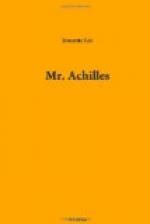James, from his box, looked up, and the reins tightened in the big hands. The horses pranced and clicked their hoofs and stood still; and James, leaning a respectful ear, touched his hat-brim, and they were off, the harnesses glinting and the little red cherries bobbing in the sun.
X
FOR A LONG DRIVE
Betty Harris sat very still—her hands in her lap, her face lifted to the breeze that touched it swiftly and fingered her hair and swept past. Presently she looked up with a nod—as if the breeze reminded her. “I should like to see Mr. Achilles,” she said.
“Not to-day,” answered Miss Stone, “we must do the errands for mother to-day, you know.”
The child’s face fell. “I wanted to see Mr. Achilles,” she said simply. She sat very quiet, her eyes on the lake. When she looked up, the eyes had brimmed over.
“I didn’t mean to,” said the child. She was searching for her handkerchief and the little cherries bobbed forward. “I didn’t know they would spill!” She had found the handkerchief now and was wiping them away, and she smiled at Miss Stone—a brave smile—that was going to be happy—
Miss Stone smiled back, with a little head-shake. “Foolish, Betty!”
“I didn’t expect them,” said the child, “I was just thinking about Mr. Achilles and they came—just came!—They just came!” she repeated sternly. She gave a final dab to the handkerchief and stowed it away, sitting very erect and still.
Miss Stone’s eyes studied her face. “We cannot go to-day,” she said, “—and to-morrow we start for the country. Perhaps—” she paused, thinking it out.
But the child’s eyes took it up—and danced. “He can make us a visit,” she said, nodding—“a visit of three weeks!” She smiled happily.
Miss Stone smiled back, shaking her head. “He could not leave the fruit-shop—”
But the child ignored it. “He will come,” she said quickly, “and we shall talk—and talk—about the gods, you know—” She lifted her eyes, “and we shall go in the fields—He will come!” She drew a deep sigh of satisfaction and lifted her head.
And Miss Stone, watching her, had a feeling of quick relief. She had known for a day or two that the child was not well, and they had hurried to get away to the fields. This was their last drive. To-morrow the horses would be sent on; and the next day they would all go—in the great touring car that would eat up the miles, and pass the horses, and reach Idlewood long before them.
No one except Betty and Miss Stone used the horses now. They would have been sold long ago had it not been for the child. The carriage was a part of her—and the clicking hoofs and soft-shining skins and arching necks. The sound of the hoofs on the pavement played little tunes for Betty. Her mother had protested against expense, and her father had grumbled a little; but if the child wanted a carriage rather than the great car that could whir her away in a breath, it must be kept.




